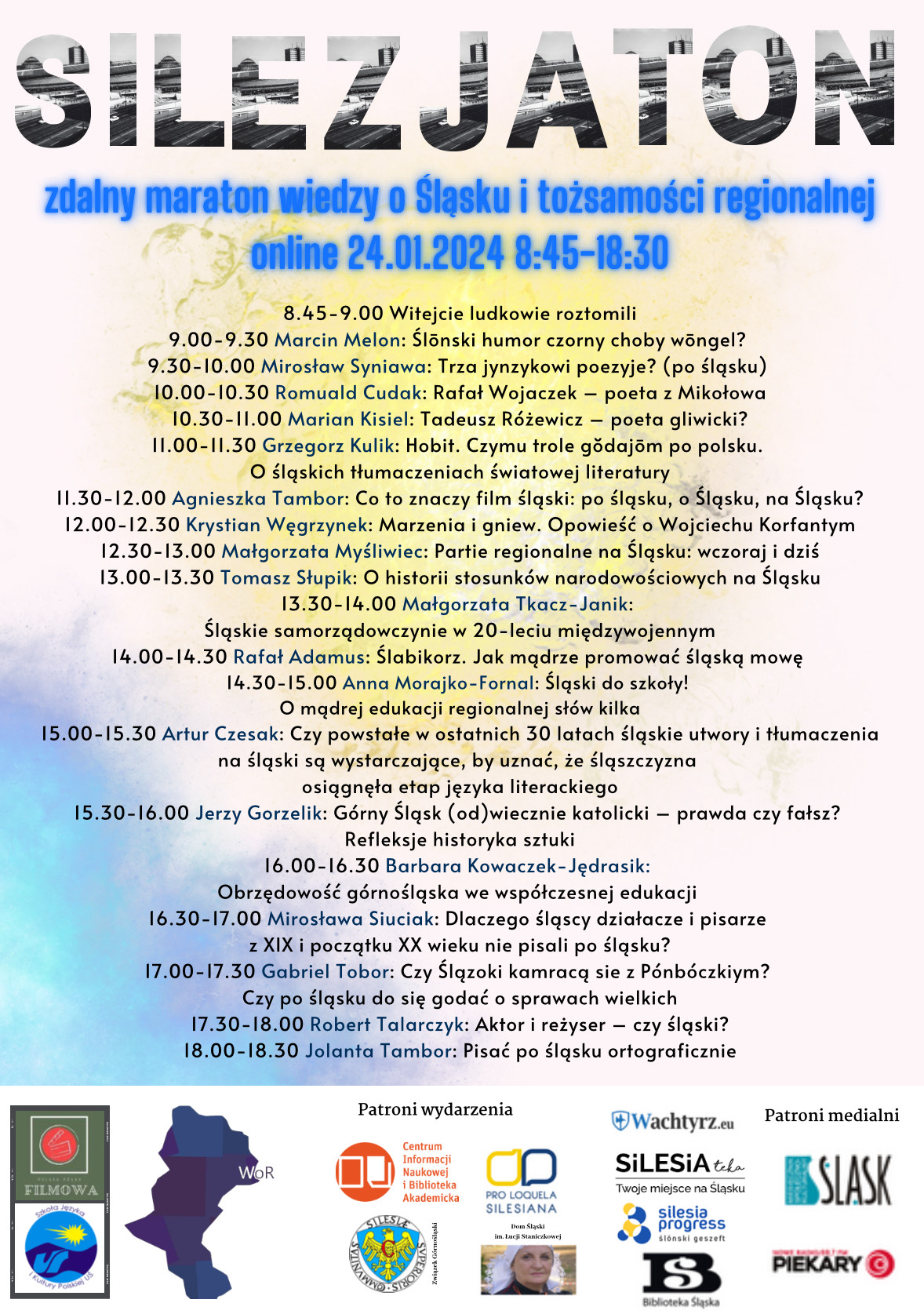On 24 January 2024, SilezjatON – a remote marathon of knowledge about Silesia, Silesian affairs and regional identity will take place.
In times when we often talk about the concepts of identity and identification and when we are constantly asked “who we are”, it is worth considering what a small homeland is – a place of birth, a place of work, or maybe even just an address? During the marathon, we will present identification and identity issues on the example of our small homeland, i.e. Silesia.
We offer Silesians and all people from outside our region who are interested in it for various reasons to take part in the marathon. Before you give Silesia your own personal perspective, you may want to find out where and what Silesia is. It is often said that Silesia has a complicated history, but the region’s present-day situation seems no less complicated.
If you want to learn more about literature, film, music, cuisine, language, religious, historical and geographical conditions in an accessible and interesting form, join us! If you don’t know anything about Silesia, you will learn everything you need to know. However, if you feel quite confident in the meanders of this region, the marathon will certainly not disappoint you – you will have fun and deepen your knowledge.
Everything you wanted to know about Silesia, but were always too afraid to ask, will be said by lecturers, university teachers, poets and prose writers, translators, activists and regionalists.
In order to join the event, you have to fill out the registration form.
Programme
- 8.45–9.00 a.m.: Witejcie ludkowie roztomili [Welcome, dearest people]
- 9.00–9.30 a.m.: Marcin Melon: ‘Ślōnski humor czorny choby wōngel?’ [Silesian humour black as coal?]
- 9.30–10.00 a.m.: Mirosław Syniawa: ‘Trza jynzykowi poezyje? (po śląsku)’ [Does language need poetry? (in Silesian)]
- 10.00–10.30 a.m.: Romuald Cudak: ‘Rafał Wojaczek – poeta z Mikołowa’ [Rafał Wojaczek – poet from Mikołów]
- 10.30–11.00 a.m.: Marian Kisiel: ‘Tadeusz Różewicz – poeta gliwicki?’ [Tadeusz Różewicz – Gliwice poet?]
- 11.00–11.30 a.m.: Grzegorz Kulik: ‘Hobit. Czymu trole gŏdajōm po polsku. O śląskich tłumaczeniach światowej literatury’ [Hobbit. Why trolls speak Polish. About Silesian translations of world literature]
- 11.30 a.m.–12.00 p.m.: Agnieszka Tambor: ‘Co to znaczy film śląski: po śląsku, o Śląsku, na Śląsku?’ [What does a Silesian film mean: in Silesian, about Silesia, in Silesia?]
- 12.00–12.30 p.m.: Krystian Węgrzynek: ‘Marzenia i gniew. Opowieść o Wojciechu Korfantym’ [Dreams and anger. The Story of Wojciech Korfanty]
- 12.30–1.00 p.m.: Małgorzata Myśliwiec: ‘Partie regionalne na Śląsku: wczoraj i dziś’ [Regional political parties in Silesia: in the past and today]
- 1.00–1.30 p.m.: Tomasz Słupik: ‘O historii stosunków narodowościowych na Śląsku’ [On the history of national relations in Silesia]
- 1.30–2.00 p.m.: Małgorzata Tkacz-Janik: ‘Śląskie samorządowczynie w 20-leciu międzywojennym’ [Women of the Silesian local government in the interwar period]
- 2.00–2.30 p.m.: Rafał Adamus: ‘Ślabikorz. Jak mądrze promować śląską mowę’ [Silesian primer. How to smartly promote the Silesian language]
- 2.30–3.00 p.m.: Anna Morajko-Fornal: ‘Śląski do szkoły! O mądrej edukacji regionalnej słów kilka’ [Silesian to school! A few words about proper regional education]
- 3.00–3.30 p.m.: Artur Czesak: ‘Czy powstałe w ostatnich 30 latach śląskie utwory i tłumaczenia na śląski są wystarczające, by uznać, że śląszczyzna osiągnęła etap języka literackiego’ [Are the Silesian works and translations into Silesian created in the last 30 years sufficient to recognise that the Silesian language has reached the stage of a literary language?]
- 3.30–4.00 p.m.: Jerzy Gorzelik: ‘Górny Śląsk (od)wiecznie katolicki – prawda czy fałsz? Refleksje historyka sztuki’ [Upper Silesia (forever) Catholic – true or false? Reflections of an art historian]
- 4.00–4.30 p.m.: Barbara Kowaczek-Jędrasik: ‘Obrzędowość górnośląska we współczesnej edukacji’ [Upper Silesian rituals in contemporary education]
- 4.30–5.00 p.m.: Mirosława Siuciak: ‘Dlaczego śląscy działacze i pisarze z XIX i początku XX wieku nie pisali po śląsku?’ [Why didn’t Silesian activists and writers from the 19th and early 20th centuries write in Silesian?]
- 5.00–5.30 p.m.: Gabriel Tobor: ‘Czy Ślązoki kamracą sie z Pónbóczkiym? Czy po śląsku do się godać o sprawach wielkich’ [Are Silesians friends with God? Is it possible to speak on great matters in Silesian?]
- 5.30–6.00 p.m.: Robert Talarczyk: ‘Aktor i reżyser – czy śląski?’ [Actor and director – Silesian?]







